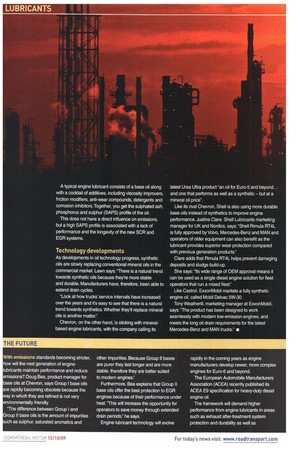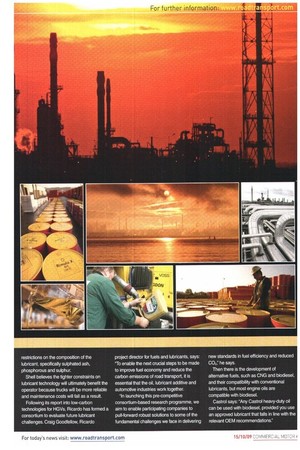With emissions standards becoming stricter, how will the next generation
Page 42

Page 43

If you've noticed an error in this article please click here to report it so we can fix it.
of engine lubricants maintain performance and reduce emissions? Doug Bea, product manager for base oils at Chevron, says Group I base oils are rapidly becoming obsolete because the way in which they are refined is not very environmentally friendly.
"The difference between Group I and Group II base oils is the amount of impurities uch as sulphur, saturated aromatics and other impurities Because Group II bases are purer they last longer and are more stable, therefore they are better suited to modern engines."
Furthermore. Bea explains that Group ll base oils offer the best protection to EGR engines because of their performance under heat. "This will increase the opportunity for operators to save money through extended drain periods," he says.
Engine lubricant technology will evolve rapidly in the coming years as engine manufacturers develop newer, more complex engines for Euro-6 and beyond.
The European Automobile Manufacturers Association (ACEA) recently published its ACEA E9 specification for heavy-duty diesel engine oil The framework will demand higher performance from engine lubricants in areas such as exhaust after-treatment system protection and durability as well as restrictions on the composition of the lubricant, specifically sulphated ash, phosphorous and sulphur.
Shell believes the tighter constraints on lubricant technology will ultimately benefit the operator because trucks will be more reliable and maintenance costs will fall as a result.
Following its report into low-carbon technologies for HGVs, Ricardo has formed a consortium to evaluate future lubricant challenges. Craig Goodfellow, Ricardo
project director for fuels and lubricants says. "To enable the next crucial steps to be made to improve fuel economy and reduce the carbon emissions of road transport, it is essential that the oil, lubricant additive and automotive industries work together.
In launching this pre-competitive consortium-based research programme, we aim to enable participating companies to pull-forward robust solutions to some of the fundamental challenges we face in delivering
new standards in fuel efficiency and reduced CO2," he says
Then there is the development of alternative fuels, such as CNG and biodiesel, and their compatibility with conventional lubricants, but most engine oils are compatible with biodiesel.
Castrol says: "Any Castrol heavy-duty oil can be used with biodiesel. provided you use an approved lubricant that falls in line with the relevant OEM recommendations."












































































































































